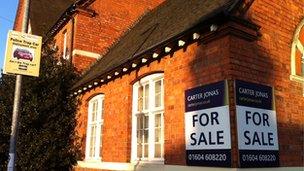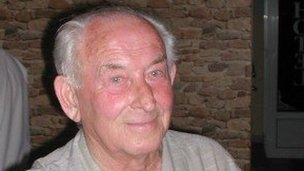Young Poles 'failing to integrate'
- Published

The Polish ex-servicemen's club in Wellingborough has been shut down
The failure of young migrants to integrate with the community has been blamed for the closure of a Polish club in Northamptonshire.
The ex-servicemen's club on Winstanley Road, Wellingborough, was put on sale this week after a steady decline in the number of club members - despite the increased number of Polish immigrants in the county.

Zdislaw Niedowoz said the Polish language has developed
In 2008 government figures revealed there were more than 10,000 Eastern Europeans working in Northampton alone, in a total population of about 200,000.
Such was the influx in 2008 that officials from Northamptonshire County Council investigated the possibility of translating some of the county's road signs to help Eastern Europeans, while some Northamptonshire police officers started to learn Polish to deal with the growing number of incomers.
Anna Randall, chair of the club's committee, said the young generation of migrants had come to England to earn but not to settle.
She said: "Unfortunately the young generation that are here now to work and gain money are not interested in integrating with the community on a wider scale, they are only here for a short period.
"All of the older generation would like to see the younger generation get involved but they are not interested."
The young migrants' apparent lack of interest in the community club has been put down to changes in culture - including a language barrier.
Polish resident Zdislaw Niedowoz, 86, who moved from Poland to Wellingborough after serving in World War II, said the changes in language had made it harder for young Poles to mix with the older generation.
"The Polish language that my friends, family and I speak is slightly different to the language spoken by young Poles coming over to live and work in the UK.
"Language evolves, and given that I've been in the UK for over 60 years mine hasn't changed that much, and is therefore more formal."
Pawel Kuc, 39, who moved to Northampton two years ago and now runs a website to help migrants get accustomed to British life, believes the developments in language are part of many differences between the past and present migrants from Poland.
'Very sad'
He said: "After the Second World War migrants came here came to stay, but now there are a lot of people here for a limited amount of time, and they come to work.
"You interact differently with a community if you plan to stay there. For many young Polish people this is not their home.
"Young migrants who want to get involved with the community tend to find clubs and groups online, through the internet... and they organise events for themselves."
Whether down to general lack of interest, or changes in culture, the lack of membership numbers has meant the end of the club in Wellingborough.
Mrs Randall added: "It's very sad to see it close - it has been part of the community for such a long time."
The clubhouse was bought by Polish former combatants following World War II at a time when strong links between Britain and Poland had been formed.
After Nazi Germany's invasion of Poland in 1939 the Polish government was reconvened in exile in Britain.
And in 1947 the British government passed the Polish Resettlement Act, which led to more than 200,000 displaced Polish troops taking up British citizenship.
It helped to establish a sizeable Polish-British community and the formation of many institutions like Wellingborough's Polish ex-servicemen's club.